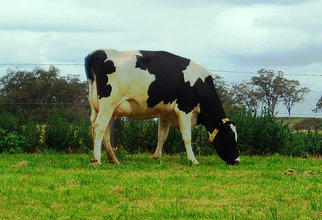|
In response to a question from someone, I would like to post my answer here. She had read that goat’s milk was far better for humans than cow’s milk and wanted to know what I thought. Well let’s go with the obvious right off the bat. In a visual comparison, goat’s milk looks whiter than cow’s milk (due to the fact that goats convert all carotenes into vitamin A making goat milk higher in vitamin A) and there is no cream line in the jar of goat’s milk like there is in unhomogenized cow’s milk. Homogenization is what happens to all the cow’s milk that you purchase in the grocery store where it is illegal to buy raw milk. This is a process in which the cream is dispersed throughout the milk causing it not to rise to the top. In my opinion this is an unhealthy process. The fat globules are forced through very small holes at high pressure making them break apart producing free radicals. These free radicals can pentrate the intestinal wall and into the bloodstream and is capable of creating scar damage to the heart and arteries, which in turn may stimulate the body to release cholesterol in the blood. Cholesterol is not a bad thing, it’s actually good in the fact that it is like a little ambulance crew going to the rescue to patch up weaknesses in arteries. What we need to do is try to eat and live in a way that this litte ambulance crew is not needed quite so often and that means eating a healthy diet with the good fats and leaving off all that sugar and rancid vegetable oils which cause lots of problems. You have all heard of free radicals. They are unstable atoms or molecules that bounce around in your body causing damage to your cells leaving you with many diseases. We age over time due to free radical damage that causes oxidative stress. You have heard of antioxidants, haven’t you? Well antioxidants suppose to counteract oxidative stress. Therefore, homogenization gets a thumbs down vote from me. Goat milk is naturally homogenized and doesn’t have the cream line because the fat globules in goat milk are smaller than those in cow milk and that means there is more surface volume and so it will be easier to digest. As goat milk curdles in your stomach it produces softer curds than cow’s milk allowing the protein to be digested easier too. Some people have problems with a certain protein in cow’s milk and this certain protein is far less in goat’s milk allowing many people to be able to drink goat’s milk over cow’s milk. I personally do not have a problem with cow’s milk so I couldn’t speak about this fact. Also, some have problems with the sugar in cow’s milk called lactose because they lack the enzyme lactase that is needed to digest the lactose making them lactose intolerant. Goat’s milk contains a little less lactose than cow’s milk. One very obvious difference between the milks is that many, including myself, say that goat milk tastes “goaty.” I ordered some farm fresh goat’s milk and I just couldn’t stand the goaty taste so I put it in the freezer until I decide what I will do with it. I have a friend who says it makes the best tasting cheese around so I’m waiting to make cheese with it. The “goaty” taste is due to the fact that the there was a buck around especially during milking time. Bucks have strong smelling scent glands but the females do not and so milk produced in the absence of a buck should produce non “goaty” taste. I also learned that if kept longer than a week the milk can get the “goaty” taste as well. Cow’s milk is higher in Vitamins B-6 and B-12 but B-6 is destroyed by pasteurization so that is a good reason to try to obtain unpasturized farm fresh milk. Another difference between the two milks is the cost. Cow’s milk is cheaper by far and this alone may make cow’s milk the preferred choice in many homes. I’m sure there are many other differences that could be made but I have chosen a few. Personally, I think that it is best to consume different food items and not eat or drink the same thing all the time. This gives your body a better defense at overcoming allergens. The bottom line is that this choice will be an individual one depending on how well the milk is tolerated. Goat milk is certainly worth a try if you have digestive problems with cow's milk. Cow Photo Credit: Flickr Goat Photo Credit: Flickr |
Debbie Vail, NC
Greetings from east central Alabama and welcome to my site. I am a graduate of Hawthorn University, a leader in holistic education. See more about me and my educational experience. Please see my resources page for your supplement needs Categories
All
Archives
April 2021
|




